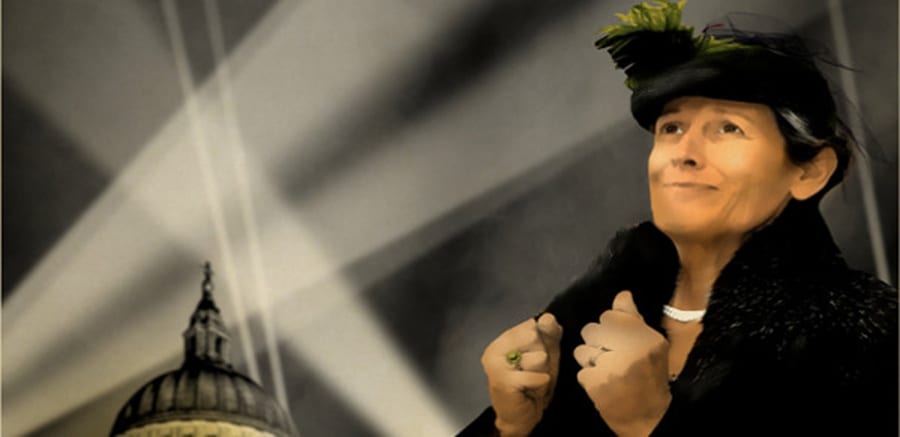I’m dying. I know, and I don’t care. Seated underneath strings of antiqued red and white flags, the very edges of which looking homemade and worn, we meet the first lady on her deathbed. She shivers, yet her booming voice still makes demands. Even in the apocalyptic present of the Cuban Missile Crisis, she remains stalwart, resilient, hopeful. Then, draped in Eleanor’s trademark fur coat, and armed with a feathered hat, Alison Skilbeck explodes her initial seated position: the rush of energy propels her across the stage and she becomes the woman of action, hands purposeful and smile daring as Skilbeck’s animation of the First Lady’s writings burst into a youthfully energetic narrative.
The inspirational figure of Eleanor Roosevelt is perhaps the ideal character for a one-woman show, and vice versa, as no other format could hope to capture the industrious First Lady in her entirety. That being said, Alison Skilbeck’s Mrs. Roosevelt Flies to London comes to King’s Head Theatre as a phenomenally well-researched re-telling on Eleanor’s trip to WWII Britain.
Told as though reading excerpts from a personal diary, Skilbeck’s selections impart a startling intimacy. Whilst it may be told from Eleanor’s perspective, it is very apparently not just Eleanor’s story: it is the story of all women involved in the wartime effort in Britain. It is the story of the Queen, of Mrs. Churchill. It is the story of Marie Souvestre, of Lorena Hickok. It is as much in commemoration of the women of WWII as it is in celebration of all independent women and Eleanor herself.
The narrative itself presents a little bit of a problem. Skilbeck has clearly done her reading, and as there’s not a strict sense of trajectory or plot to the proceedings, if you do not know anything about Eleanor Roosevelt, you can easily fall behind in watching, as the pace with which Skilbeck bulldozes through scenes is admirable yet relentless. Yet the disassembled, jumpy narrative allows for such a universal narrative allows to broken down into bite-size, relatable and palatable pieces, easily consumed by all women throughout the ages. If anything, Mrs. Roosevelt Flies to London is a play to see if you believe in the inalienable universal rights of all humanity, and are well read enough in history to keep up with the pace.
Unfortunately, as a young female American, I can’t help but feel that Skilbeck’s persistent English accent preserves her as a peaceable English mother about to invite me to tea, rather than transforming her into the formidable New York woman who graced the pages of my history books. Yet it is Skilbeck’s dialogue that preserves the greatness of the First Lady, as Skilbeck’s selections from Eleanor’s writings evince the unadulterated voice of a woman ahead of her time.

